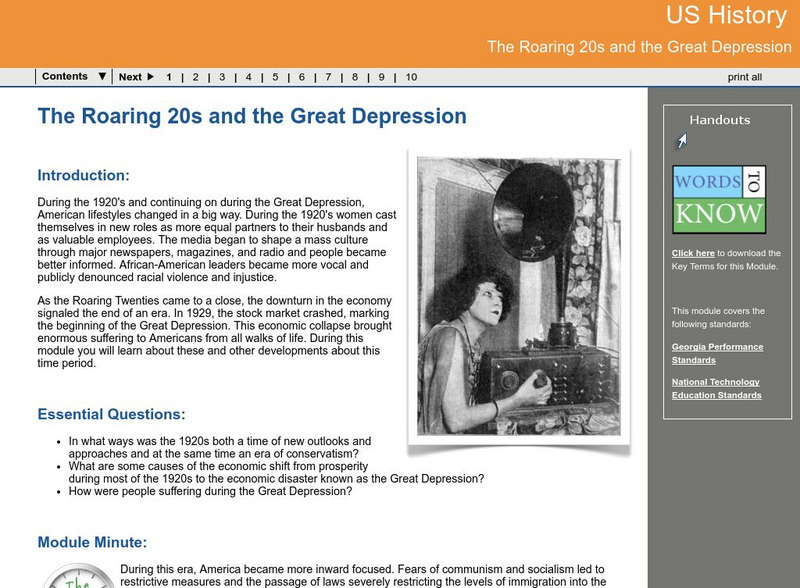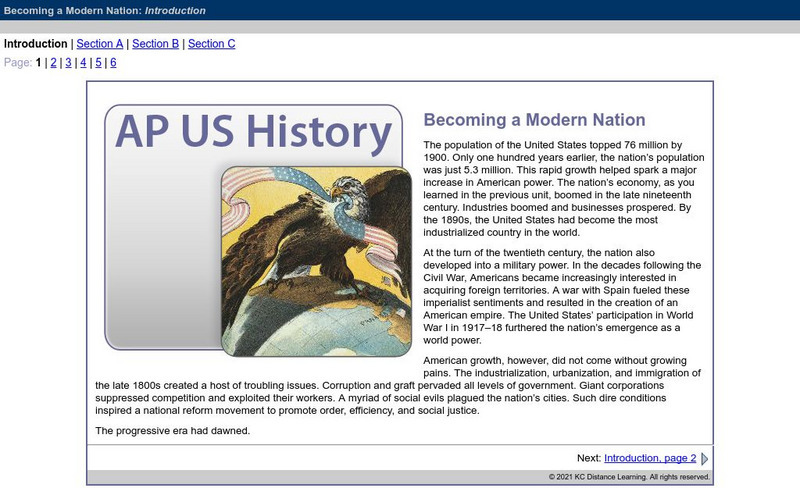Hi, what do you want to do?
Curated OER
Hoboes on Harvest
Students study the role Oklahoma's wheat fields played in the history of labor movements in the US. They write imaginary letters describing their experiences on a wheat harvest. They research on the internet or in encyclopedias to find...
Curated OER
The History of Ethanol in America
Sixth graders explore and examine the production of biofuels from the 1850's to the present. Included in their research is Henry Ford, ethanol, World War I and prohibition. They explain the importance of grains and grasses for the...
Curated OER
Main Causes of World War Two
In this causes of World War II study guide worksheet, students discover details regarding this time period in world history. Students read 13 sections of information and examine photographs.
Curated OER
The Growth of U.S.-Japanese Hostility, 1915-1932
Students explore the relationship between Japan and the United States between 1915 and 1932. In this diplomacy instructional activity, students examine the Open Door Policy, 21 Demands, and the invasion of Manchuria by Japan. Students...
Curated OER
Legislating neutrality
Eleventh graders explore the Merchants of death thesis. In this American History instructional activity, 11th graders explain the Neutrality Laws. Students assess the overall effectiveness of US neutrality policy.
Curated OER
Why do wars occur?
Understanding the causes of war is one way (possibly) to prevent it. World War II is used as a case study to facilitate an understanding of reasons why wars start. Topics covered included Totalitarianism, scarcity of resources, need for...
National Humanities Center
Teaching The Great Gatsby: A Common Core Close Reading Seminar
The 41 slides in a professional development seminar model how to use close reading techniques to examine the many layers of F. Scott Fitzgerald's The Great Gatsby. In addition to passages from the novel, slides provide biographical...
Curated OER
The Causes of Prohibition
Eleventh graders explore the origins of the Prohibition Movement in the United States. In small groups, they analyze the influence of World War I in the passage of the eighteenth amendment. Students explain how different demographics of...
Curated OER
Perception Propaganda
Eleventh graders explore the various uses of perception, propaganda, and perspective. In this Social Studies lesson, 11th graders distinguish between fact and fiction. Students analyze the impact of conflict on society.
Curated OER
The Harlem Renaissance
High schoolers, after researching/analyzing the movement "Harlem Renaissance" and Africa as well as reading literature from that time period, create lists of the major characteristics of the movement and its important writers. They...
Curated OER
Karen Hesse's Witness; Tolerance and Non-Discrimination
Students complete a graphic organizer depicting character views regarding African Americans during the early 20th century in America. In this graphic organizer of views lesson, students read the book Witness and become familiarized with...
Scholastic
Marijuana: Breaking Down the Buzz
There are a lot of myths surrounding marijuana. Read a passage that clarifies the dangers of teens smoking marijuana, its harmful effects on the development of the brain, and the possible correlation of cigarette smoking to marijuana...
Curated OER
Those Who Don't Know: Identity, Membership, and Stereotypes
Students explore their identities. In this social studies lesson, students examine stereotyping and discuss factors that define their personal identities. Students compare their stories to the story of Esperanza in the novel Esperanza...
Georgia Department of Education
Ga Virtual Learning: Ap Us History: 1920s, the Great Depression, & World War Ii
AP U.S. History learning module on 20th Century eras and events including the 1920s, Great Depression, and World War II. Comprehensive multi-media lesson materials.
CK-12 Foundation
Ck 12: Epsid 2019 2020 Us History
Flexbooks 2.0 are interactive, customizable, digital textbooks. Flexbooks are standards-aligned. Flexi, a student tutor, is integrated into each book to guide you on your learning journey. Flexi can assist in learning, answer questions,...
Khan Academy
Khan Academy: Us History: 1890 1945: Quiz 3
Take this five-question quiz that checks comprehension over parts of US history between 1890-1945.
Georgia Department of Education
Ga Virtual Learning: Us History: The Roaring 20s and the Great Depression
Learning module in U.S. History with interactive materials, assignments, projects and assessment on America during the 1920s and the Great Depression.
Khan Academy
Khan Academy: Us History: 1890 1945: 1920s: Cultural and Political Controversies
A quick comprehension check over cultural and political controversies of the 1920s.
Khan Academy
Khan Academy: Us History: 1890 1945: 1920s Consumption
In the 1920s, assembly line production and easy credit made it possible for ordinary Americans to purchase many new consumer goods.
Khan Academy
Khan Academy: Us History: 1890 1945:20s: Innovations in Communication/technology
A quick comprehension check over innovations in communication and technology in the 1920s.
Khan Academy
Khan Academy: Us History: 1945 1980: The Reemergence of the Kkk
Disbanded after Reconstruction, the KKK returned to national prominence in the 1920s to direct its hatred against African Americans, Catholics, Jews, and immigrants.
Khan Academy
Khan Academy: Ap Us History: 1890 1945: The Age of Empire: The Progressive Era
The Progressive Era from the 1890s to the 1920s evolved as a response to the negative effects of industrialization. Reforms that emerged provided protections for workers and consumers and gave women voting rights. Backlash against the...
Department of Defense
Do Dea: Ap Us History: Unit 6: Becoming a Modern Nation
This extensive learning module examines the role of large-scale industrialization, urbanization, and mass migrations in creating new demands on government and social organizations to design reforms, and looks at the global and domestic...
Khan Academy
Khan Academy: Us History: 1890 1945: Republican Ascendancy: Politics in the 20s
With the waning of the Progressive Era, the political landscape of Republican presidents like Warren G. Harding and Calvin Coolidge emphasized business interests.




























